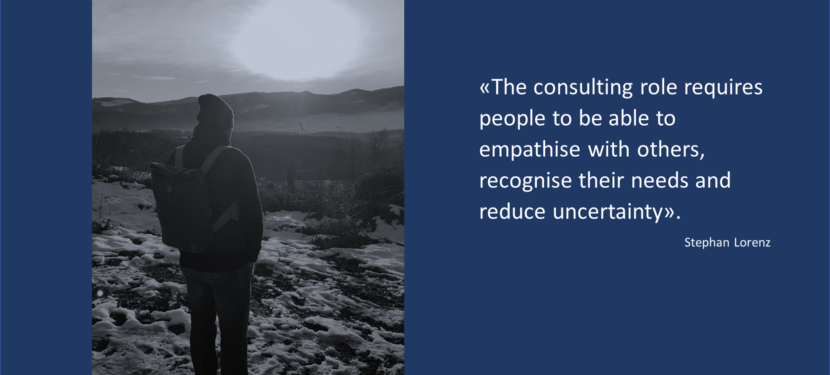A little thought that came to me today: «Actually, we’re all consultants». The following lines shed light on my thoughts regarding the transformation of the world of work, in which consulting activities are increasingly taking centre stage, not only for traditional consulting professions, but also for specialists in almost all sectors. This trend is underlined by scientific studies and current developments, such as findings from the Harvard Business Review (HBR), which show that the ability to advise is one of the most important skills in a working world that is becoming increasingly complex and technology-driven.
The consulting role today encompasses far more than simply imparting specialised knowledge. Employees take on advisory tasks such as
- ➜ Problem analysis and solution development: studies, such as those by Deloitte (2022), show that over 70% of companies expect their employees not only to complete existing tasks, but also to actively develop and implement innovative solutions.
- ➜ Stakeholder management: The ability to understand and take into account different interests and perspectives is key. According to an HBR study from 2023, companies rate the ability to moderate different parties and facilitate decisions as crucial to leadership success.
- ➜ Technology integration: In the IT sector, specialists advise on the introduction of new technologies, for example. The success of these technologies depends on how well they are customised and integrated to meet the needs of users, a process that requires intensive consulting.
- ➜ A.m.m.
🔎 One practical example is the use of AI-supported systems in the financial sector. A study by the University of Oxford (2021) showed that although 60% of repetitive financial tasks can be automated by AI, the demand for human advisors is increasing as customers appreciate the importance of personalised recommendations. This illustrates that automation does not reduce the need for advice, but shifts it away from operational tasks and towards strategic support.
The integration of AI into work processes poses a double challenge. On the one hand, AI performs routine tasks more autonomously, such as generating reports or analysing large amounts of data. On the other hand, the role of humans is becoming more important in bridging the gap between technology and individual needs. Here, HBR (2023) shows that consultants are increasingly acting as “connecting elements”, linking technical solutions with the strategic goals of an organisation. In this way, consulting is not only becoming more technical, but also more human, with a focus on empathy, communication and trust.
🔎 One example of this development is the use of chatbots in customer service departments. While simple enquiries are being automated, a McKinsey study (2023) shows that customers are still dependent on human advice for complex issues. Here, the advisor becomes the interface between AI and personal support.
💡 From a psychological perspective, the increasing focus on consulting activities in the world of work reflects fundamental changes in the demands placed on individuals. Essentially, this means that skills such as empathy, communication skills, problem solving and the ability to self-reflect are becoming increasingly important. These changes require people to position themselves not only as professionals, but also as empathetic mediators and supporters in complex processes. The consulting role requires people to be able to empathise with others, recognise their needs and reduce uncertainty. From a psychological perspective, this is closely linked to emotional intelligence, i.e. the ability to recognise, understand and respond appropriately to one’s own and others’ emotions. Consulting activities also require a high degree of social trust, as they often take place on the basis of interpersonal relationships in which the counsellor must be perceived as a reliable and competent reference person.
The modern world of work also demands a greater awareness of one’s own identity and the ability to market oneself. In psychological terms, this means that people need to actively strengthen their self-efficacy, the confidence in their own abilities, in order to be able to present themselves and their ideas convincingly. However, this can also lead to increased pressure to perform, as the constant need to present oneself as competent and valuable can potentially increase stress and doubts about one’s own suitability.
At the same time, the integration of artificial intelligence is changing the psychological role of humans. While routine tasks are taken over by machines, humans remain responsible for the creative, strategic and emotional dimension of work. As a result, individual strengths such as the ability to innovate, flexibility and interpersonal communication are becoming more important. From a psychological point of view, people are taking centre stage as key figures who not only understand technology, but also use it in a meaningful way.
I believe that the ability to provide consulting goes far beyond a purely professional role. Studies show that soft skills such as empathy, conflict management and communication skills are becoming increasingly important. This means that successful employees not only have technical expertise, but also the ability to guide people through change processes and build trust. HBR argues that these skills will not only remain relevant in an increasingly digital and AI-supported working world, but will become even more important, as consulting is the key to using technology in a meaningful and targeted way.
💡 From my point of view, individuals who excel in consulting, consistently invest in their growth, and effectively recognize, articulate, and demonstrate their unique value are well-positioned to contribute meaningfully to this transformation while fostering their own long-term development.
👉 These considerations are neither conclusive nor fully elaborated, but should serve as an impulse for further thoughts and discussions in this direction.
👉 What are your thoughts on this? I look forward to your ideas.
Best regards
Stephan





